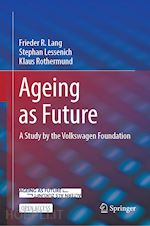
Questo prodotto usufruisce delle SPEDIZIONI GRATIS
selezionando l'opzione Corriere Veloce in fase di ordine.
Pagabile anche con Carta della cultura giovani e del merito, 18App Bonus Cultura e Carta del Docente
Contemporary societies are aging – but what does that mean? Is this something bad? And can societies age as a whole? By bringing together psychological, gerontological, and sociological findings, this open access book opens up a hitherto unique, multifaceted, and realistic view of the phenomenon of old age and the process of aging.
The volume is based on the results of the project “Ageing as Future”, a long-term project network (2007-2021) involving a total of more than 30 scientists worldwide. The focus of the project was threefold: A first issue was concerned with how views on aging influence development in old age; secondly, the project analyzed determinants and consequences of provision for old age; and thirdly, it investigated the different ways in which aging is shaped by managing time in old age.
For more than a decade, the authors conducted quantitative and qualitative studies, involving large samples from three different continents. The results show that one-sided views of old age – whether negative stereotypes or positive exaggerations – do not do justice to the complexity of the experience of aging. Based on these results, the authors plead for individual and societal acceptance of the social fact of aging – and for the right to live an autonomous and dignified life in old age just as in other phases of life.
Ageing as Future: A study by the Volkswagen Foundation presents findings from a unique large international study that are of interest to aging researchers around the world: academically, socio-politically, practically, and personally. Whether old or young, the book encourages one to question one's own views of aging. When reading this book, it becomes obvious that old age is a highly diverse experience, depending on a host of societal and individual factors.
Chapter 1: No future? Age and ageing in the "ageing society".- Chapter 2: Procedure and Data Basis.- Chapter 3: Views on Ageing.- Chapter 4: Future action and ageing preparation.- Chapter 5: Time structures of aging: Acting old age between everyday abundance of time and biographical time poverty.- Chapter 6: Age(ing) as Future - Future of Age(ing).
Dr. Frieder R. Lang is Professor of Psychology and Gerontology at Friedrich-Alexander-Universität Erlangen-Nürnberg (FAU), Germany, and Director of the Institute of Psychogerontology at the FAU. In his research and publications, he works on issues related to aging well, and on influences of future-oriented thinking and preventive action strategies on the course of aging.
Dr. Stephan Lessenich is Professor of Social Theory and Social Research at Goethe University Frankfurt am Main, Germany, and Director of the Institute for Social Research. His research focuses on social inequality research and the sociology of aging.
Dr. Klaus Rothermund is Professor of Psychology at the Friedrich Schiller University Jena, Germany. His research focuses on aging research, in particular on the role of views of aging and age norms for development and age discrimination. He is spokesperson for the project "Ageing as Future" and a member of the board of directors of the Center for Ageing Research (ZAJ) at Friedrich Schiller University in Jena.











Il sito utilizza cookie ed altri strumenti di tracciamento che raccolgono informazioni dal dispositivo dell’utente. Oltre ai cookie tecnici ed analitici aggregati, strettamente necessari per il funzionamento di questo sito web, previo consenso dell’utente possono essere installati cookie di profilazione e marketing e cookie dei social media. Cliccando su “Accetto tutti i cookie” saranno attivate tutte le categorie di cookie. Per accettare solo deterninate categorie di cookie, cliccare invece su “Impostazioni cookie”. Chiudendo il banner o continuando a navigare saranno installati solo cookie tecnici. Per maggiori dettagli, consultare la Cookie Policy.